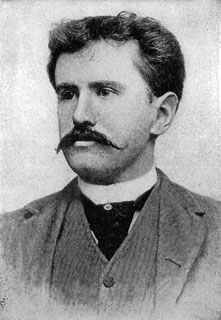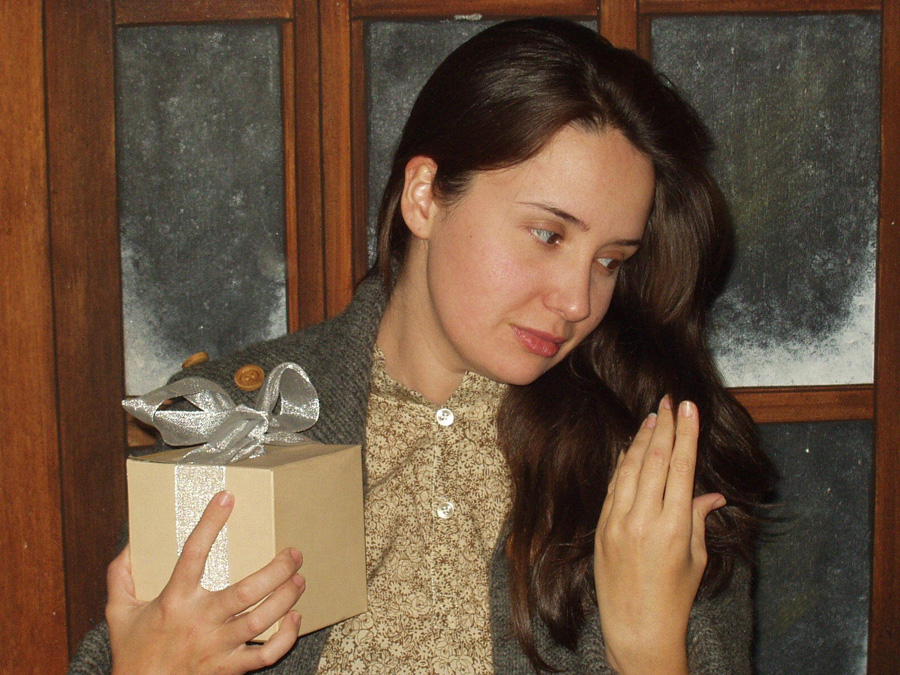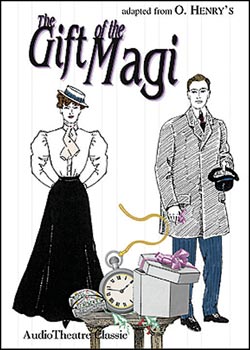| “The Gift of the Magi”
is a classic Christmas tale by O. Henry about a
young couple who each sells a precious possession to
buy a gift for the other. This is the complete text
of O’Henry’s short story, The Gift of the Magi, as
provided by
Project Gutenberg.
The
Gift of the Magi
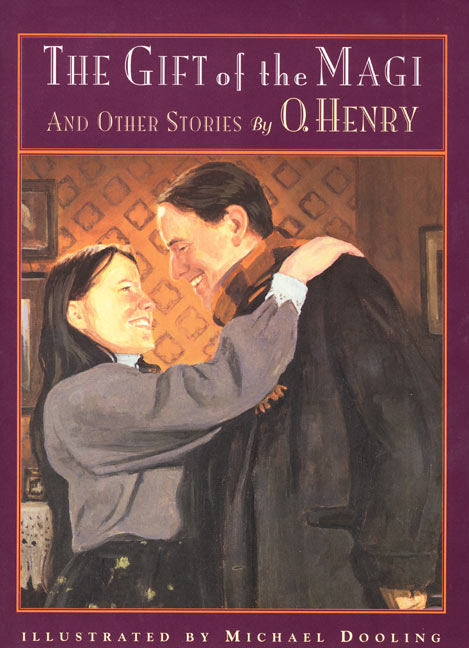
ONE dollar and eighty-seven
cents. That was all. And sixty cents of it was in
pennies. Pennies saved one and two at a time by
bulldozing the grocer and the vegetable man and the
butcher until one’s cheeks burned with the silent
imputation of parsimony that such close dealing
implied. Three times Della counted it. One dollar
and eighty-seven cents. And the next day would be
Christmas.
There was clearly nothing to
do but flop down on the shabby little couch and
howl. So Della did it. Which instigates the moral
reflection that life is made up of sobs, sniffles,
and smiles, with sniffles predominating.
While the mistress of the
home is gradually subsiding from the first stage to
the second, take a look at the home. A furnished
flat at $8 per week. It did not exactly beggar
description, but it certainly had that word on the
lookout for the mendicancy squad.
In the vestibule below was a
letter-box into which no letter would go, and an
electric button from which no mortal finger could
coax a ring. Also appertaining thereunto was a card
bearing the name “Mr. James Dillingham Young.”
The “Dillingham” had been
flung to the breeze during a former period of
prosperity when its possessor was being paid $30 per
week. Now, when the income was shrunk to $20,
though, they were thinking seriously of contracting
to a modest and unassuming D. But whenever Mr. James
Dillingham Young came home and reached his flat
above he was called “Jim” and greatly hugged by Mrs.
James Dillingham Young, already introduced to you as
Della. Which is all very good.
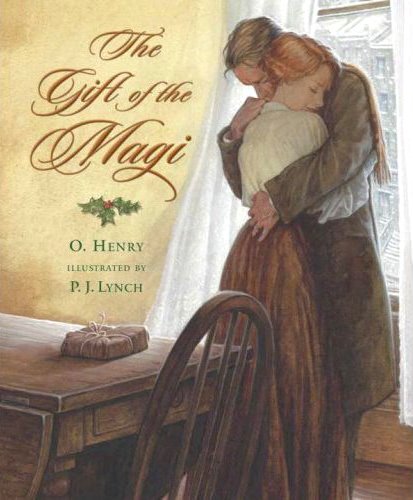
Della finished her cry and
attended to her cheeks with the powder rag. She
stood by the window and looked out dully at a gray
cat walking a gray fence in a gray backyard.
Tomorrow would be Christmas Day, and she had only
$1.87 with which to buy Jim a present. She had been
saving every penny she could for months, with this
result. Twenty dollars a week doesn’t go far.
Expenses had been greater than she had calculated.
They always are. Only $1.87 to buy a present for
Jim. Her Jim. Many a happy hour she had spent
planning for something nice for him. Something fine
and rare and sterling-something just a little bit
near to being worthy of the honor of being owned by
Jim.
There was a pier glass
between the windows of the room. Perhaps you have
seen a pier glass in an $8 flat. A very thin and
very agile person may, by observing his reflection
in a rapid sequence of longitudinal strips, obtain a
fairly accurate conception of his looks. Della,
being slender, had mastered the art.
Suddenly she whirled from
the window and stood before the glass. Her eyes were
shining brilliantly, but her face had lost its color
within twenty seconds. Rapidly she pulled down her
hair and let it fall to its full length.
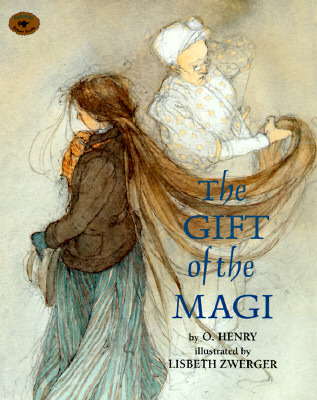
Now, there were two
possessions of the James Dillingham Youngs in which
they both took a mighty pride. One was Jim’s gold
watch that had been his father’s and his
grandfather’s. The other was Della’s hair. Had the
queen of Sheba lived in the flat across the
airshaft, Della would have let her hair hang out the
window some day to dry just to depreciate Her
Majesty’s jewels and gifts. Had King Solomon been
the janitor, with all his treasures piled up in the
basement, Jim would have pulled out his watch every
time he passed, just to see him pluck at his beard
from envy.
So now Della’s beautiful
hair fell about her rippling and shining like a
cascade of brown waters. It reached below her knee
and made itself almost a garment for her. And then
she did it up again nervously and quickly. Once she
faltered for a minute and stood still while a tear
or two splashed on the worn red carpet.
On went her old brown
jacket; on went her old brown hat. With a whirl of
skirts and with the brilliant sparkle still in her
eyes, she fluttered out the door and down the stairs
to the street.
Where she stopped the sign
read: “Mme. Sofronie. Hair Goods of All Kinds.” One
flight up Della ran, and collected herself, panting.
Madame, large, too white, chilly, hardly looked the
“Sofronie.”
“Will you buy my hair?”
asked Della.
“I buy hair,” said Madame.
“Take yer hat off and let’s have a sight at the
looks of it.”
Down rippled the brown
cascade.
“Twenty dollars,” said
Madame, lifting the mass with a practised hand.
“Give it to me quick,” said
Della.
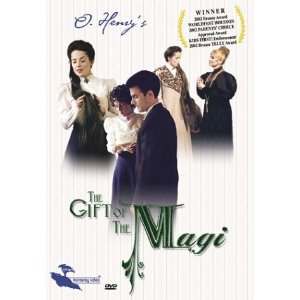
Oh, and the next two hours
tripped by on rosy wings. Forget the hashed
metaphor. She was ransacking the stores for Jim’s
present.
She found it at last. It surely had been made
for Jim and no one else. There was no other like it
in any of the stores, and she had turned all of them
inside out. It was a platinum fob chain simple and
chaste in design, properly proclaiming its value by
substance alone and not by meretricious
ornamentation-as all good things should do. It was
even worthy of The Watch. As soon as she saw it she
knew that it must be Jim’s. It was like him.
Quietness and value-the description applied to both.
Twenty-one dollars they took from her for it, and
she hurried home with the 87 cents. With that chain
on his watch Jim might be properly anxious about the
time in any company. Grand as the watch was, he
sometimes looked at it on the sly on account of the
old leather strap that he used in place of a chain.
When Della reached home her
intoxication gave way a little to prudence and
reason. She got out her curling irons and lighted
the gas and went to work repairing the ravages made
by generosity added to love. Which is always a
tremendous task, dear friends-a mammoth task.
Within forty minutes her
head was covered with tiny, close-lying curls that
made her look wonderfully like a truant schoolboy.
She looked at her reflection in the mirror long,
carefully, and critically.
“If Jim doesn’t kill me,”
she said to herself, “before he takes a second look
at me, he’ll say I look like a Coney Island chorus
girl. But what could I do-oh! what could I do with a
dollar and eighty-seven cents?”
At 7 o’clock the coffee was
made and the frying-pan was on the back of the stove
hot and ready to cook the chops.
Jim was never late. Della
doubled the fob chain in her hand and sat on the
corner of the table near the door that he always
entered. Then she heard his step on the stair away
down on the first flight, and she turned white for
just a moment. She had a habit of saying a little
silent prayer about the simplest everyday things,
and now she whispered: “Please God, make him think I
am still pretty.”
The door opened and Jim
stepped in and closed it. He looked thin and very
serious. Poor fellow, he was only twenty-two-and to
be burdened with a family! He needed a new overcoat
and he was without gloves.
Jim stopped inside the door,
as immovable as a setter at the scent of quail. His
eyes were fixed upon Della, and there was an
expression in them that she could not read, and it
terrified her. It was not anger, nor surprise, nor
disapproval, nor horror, nor any of the sentiments
that she had been prepared for. He simply stared at
her fixedly with that peculiar expression on his
face.
Della wriggled off the table
and went for him.
“Jim, darling,” she cried,
“don’t look at me that way. I had my hair cut off
and sold because I couldn’t have lived through
Christmas without giving you a present. It’ll grow
out again-you won’t mind, will you? I just had to do
it. My hair grows awfully fast. Say ‘Merry
Christmas!’ Jim, and let’s be happy. You don’t know
what a nice-what a beautiful, nice gift I’ve got for
you.”
“You’ve cut off your hair?”
asked Jim, laboriously, as if he had not arrived at
that patent fact yet even after the hardest mental
labor.
“Cut it off and sold it,”
said Della. “Don’t you like me just as well, anyhow?
I’m me without my hair, ain’t I?”
Jim looked about the room
curiously.
“You say your hair is gone?”
he said, with an air almost of idiocy.
“You needn’t look for it,”
said Della. “It’s sold, I tell you-sold and gone,
too. It’s Christmas Eve, boy. Be good to me, for it
went for you. Maybe the hairs of my head were
numbered,” she went on with sudden serious
sweetness, “but nobody could ever count my love for
you. Shall I put the chops on, Jim?”
Out of his trance Jim seemed
quickly to wake. He enfolded his Della. For ten
seconds let us regard with discreet scrutiny some
inconsequential object in the other direction. Eight
dollars a week or a million a year-what is the
difference? A mathematician or a wit would give you
the wrong answer. The magi brought valuable gifts,
but that was not among them. This dark assertion
will be illuminated later on.
Jim drew a package from his
overcoat pocket and threw it upon the table.
“Don’t make any mistake,
Dell,” he said, “about me. I don’t think there’s
anything in the way of a haircut or a shave or a
shampoo that could make me like my girl any less.
But if you’ll unwrap that package you may see why
you had me going a while at first.”
White fingers and nimble
tore at the string and paper. And then an ecstatic
scream of joy; and then, alas! a quick feminine
change to hysterical tears and wails, necessitating
the immediate employment of all the comforting
powers of the lord of the flat.
For there lay The Combs-the
set of combs, side and back, that Della had
worshipped long in a Broadway window. Beautiful
combs, pure tortoise shell, with jewelled rims-just
the shade to wear in the beautiful vanished hair.
They were expensive combs, she knew, and her heart
had simply craved and yearned over them without the
least hope of possession. And now, they were hers,
but the tresses that should have adorned the coveted
adornments were gone.
But she hugged them to her
bosom, and at length she was able to look up with
dim eyes and a smile and say: “My hair grows so
fast, Jim!”
And then Della leaped up
like a little singed cat and cried, “Oh, oh!”
Jim had not yet seen his
beautiful present. She held it out to him eagerly
upon her open palm. The dull precious metal seemed
to flash with a reflection of her bright and ardent
spirit.
“Isn’t it a dandy, Jim? I
hunted all over town to find it. You’ll have to look
at the time a hundred times a day now. Give me your
watch. I want to see how it looks on it.”
Instead of obeying, Jim
tumbled down on the couch and put his hands under
the back of his head and smiled.
“Dell,” said he, “let’s put
our Christmas presents away and keep ‘em a while.
They’re too nice to use just at present. I sold the
watch to get the money to buy your combs. And now
suppose you put the chops on.”
The magi, as you know, were
wise men-wonderfully wise men-who brought gifts to
the Babe in the manger. They invented the art of
giving Christmas presents. Being wise, their gifts
were no doubt wise ones, possibly bearing the
privilege of exchange in case of duplication. And
here I have lamely related to you the uneventful
chronicle of two foolish children in a flat who most
unwisely sacrificed for each other the greatest
treasures of their house. But in a last word to the
wise of these days let it be said that of all who
give gifts these two were the wisest. Of all who
give and receive gifts, such as they are wisest.
Everywhere they are wisest. They are the magi.
 |

